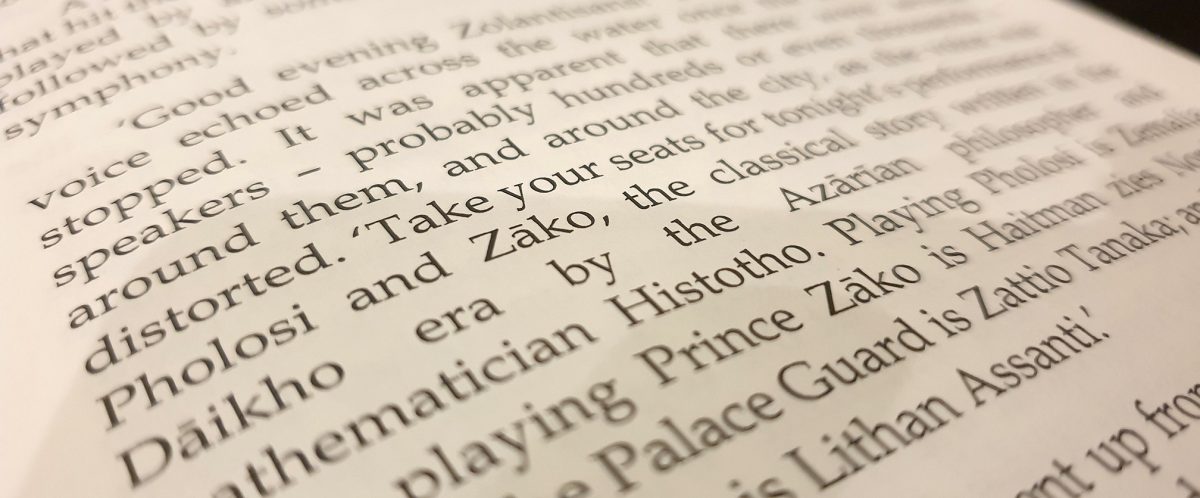It’s been a slow week. Many things have interrupted my writing.
I did write some more in Project 201811 – only a few hundred words, but they were good words. What I wrote almost certainly won’t change much between now and the final draft.
This is something that I find often now. I can often write something just the way I want it the first time. Many of the stories in OTSOT 2 and some in OTSOT 1 were like that, as well as many of the off-series short stories. This is different to Zolantis, and all of the stuff that I was writing before that, where the text changed drastically between the first and last drafts.
On the one hand, I quite like that this happens now – that I can get things right the first time. It saves a lot of time. Editing single lines to make the language better is a pretty quick thing to do, but changing the structure of a story once it’s been written, or adjusting the emphasis of a plot point or character trait, can add a huge amount of time to editing, because there are just so many things that need to be changed if you do that.
On the other hand, sometimes I try to aim to get something right the first time, and this is not ideal. When something just happens to turn out right the first time, great, but when you aim for it, you can end up spending a lot of time trying to anticipate every problem you’re going to encounter trying to write the story, and this is not so great.
Despite not writing very many words in the last week, I did do something else that was very important.
I have been trying to do the audiobook for On The Subject Of Trolls for two years. I thought it would take a matter of weeks, but it has taken years. That’s in large part because I keep getting distracted from the project – it’s more fun to write new stories than to record old ones. But it’s also partly because making an audiobook is not as easy as it seems.
Getting the right audio setup to begin with is quite difficult. Microphones can differ quite drastically in the quality of the sound that they produce – it’s only recently that I bought a new microphone that produces a really nice sound. The room that you’re in has a big effect on the sound. I do have a small, walk-in wardrobe that blocks all of the sound from outside, and which has almost no echo to it, and I did try using that when I first started trying to make the audiobook for OTSOT. However, you need to be able to sit down when recording an audiobook – it takes hours and hours to record, even for a short book like OTSOT – you can’t stand the entire time – and that room was too small to sit down in. So now I record audio at my desk (that you see in the videos). That’s in quite a large, echoey room, but with a certain arrangement of foam shields, the echo is mostly blocked.
There are many other technical hurdles to recording an audiobook, but on top of all of these, I had a creative hurdle too. I knew what the voices of Throch, Gogog, Hluthg, and Plolg sounded like long before I published OTSOT. (In fact, I knew what Throch’s voice sounded like the moment I started writing the first sentence of the book.) But with Fluncg, the voice that I used in my head when writing the story is not a ‘performable’ one – it’s entirely abstract – a voice that cannot exist in the real, physical world. So I needed to choose a real one.
I have been trying to come up with a real voice for Fluncg for two years, and none of them have been right. But this week, finally, I think I might have done it. I had an idea for a new voice, and I spent a while analysing it, to see if it really contained the essence of Fluncg. (That sounds like a rather disgusting perfume.) Fluncg has a very specific personality: Fluncg is easily offended, Fluncg is overly dramatic and self-centred, and Fluncg is infinitely spiteful. The voice must match that, but it must also be a fun voice – these stories are intended to be fun. I think this latest voice finally gets the balance between all of those things.
I recorded Fluncg’s lines with this new voice in just a few minutes. All I need to do now is edit the audio. I hate editing video and audio, so I always put it off, even though it never takes as long as I think it’s going to. But I’m going to try to drive towards finishing this audio story over the next week or two – it has languished for far too long.
